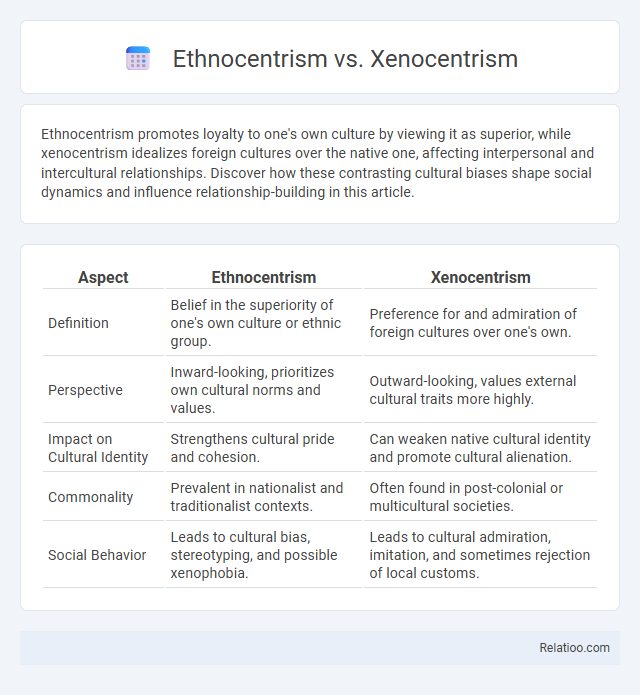Ethnocentrism promotes loyalty to one's own culture by viewing it as superior, while xenocentrism idealizes foreign cultures over the native one, affecting interpersonal and intercultural relationships. Discover how these contrasting cultural biases shape social dynamics and influence relationship-building in this article.
Table of Comparison
| Aspect | Ethnocentrism | Xenocentrism |
|---|---|---|
| Definition | Belief in the superiority of one's own culture or ethnic group. | Preference for and admiration of foreign cultures over one's own. |
| Perspective | Inward-looking, prioritizes own cultural norms and values. | Outward-looking, values external cultural traits more highly. |
| Impact on Cultural Identity | Strengthens cultural pride and cohesion. | Can weaken native cultural identity and promote cultural alienation. |
| Commonality | Prevalent in nationalist and traditionalist contexts. | Often found in post-colonial or multicultural societies. |
| Social Behavior | Leads to cultural bias, stereotyping, and possible xenophobia. | Leads to cultural admiration, imitation, and sometimes rejection of local customs. |
Understanding Ethnocentrism: Definition and Origins
Ethnocentrism refers to the belief in the inherent superiority of one's own ethnic group or culture, often resulting in biased judgments about other cultures. This concept originates from early social psychology studies and anthropological observations highlighting how in-group favoritism shapes perceptions and social behavior. Understanding ethnocentrism is crucial for addressing cultural misunderstandings and promoting cross-cultural empathy in diverse societies.
Xenocentrism Explained: Meaning and Key Features
Xenocentrism refers to the preference for products, ideas, or cultures from foreign countries over one's own, often driven by the perception that foreign is superior. Key features of xenocentrism include admiration for foreign lifestyles, skepticism towards domestic goods, and the impact on consumer behavior and cultural identity. Unlike ethnocentrism, which favors one's own culture, xenocentrism elevates external influences, shaping global cultural exchange and market dynamics.
Historical Roots of Ethnocentrism and Xenocentrism
Ethnocentrism, rooted in ancient tribalism and early human societies, reflects a preference for one's own culture and often leads to viewing other cultures as inferior. Xenocentrism, emerging historically through colonial encounters and globalization, values other cultures as superior to one's own, driven by exposure to foreign goods, ideas, and customs. Both concepts have shaped social dynamics, influencing attitudes toward cultural identity, nationalism, and intercultural relations throughout history.
Comparing Ethnocentrism vs. Xenocentrism: Core Differences
Ethnocentrism centers on the belief that Your own culture or ethnic group is superior to others, often leading to prejudice and social division. Xenocentrism contrasts this by valuing foreign cultures over one's own, creating a preference for external customs, products, or ideas. Understanding these core differences helps in recognizing how cultural biases influence attitudes and behaviors in global interactions.
Cultural Impact: How Ethnocentrism Shapes Societies
Ethnocentrism profoundly shapes societies by promoting in-group loyalty and a strong cultural identity, often leading to social cohesion within the group while fostering prejudice and discrimination against outsiders. This cultural bias reinforces dominant traditions and norms, impacting social policies, intergroup relations, and cultural preservation. Conversely, xenocentrism challenges ethnocentrism by valuing foreign cultures over one's own, which can lead to cultural hybridization but also identity conflicts within societies.
Effects of Xenocentrism on Cultural Identity
Xenocentrism often challenges cultural identity by promoting a preference for foreign cultures and values over one's own, leading to diminished cultural pride and potential loss of traditional practices. This phenomenon can cause individuals to undervalue their heritage, resulting in weakened social cohesion and identity confusion within communities. The effects of xenocentrism contrast sharply with ethnocentrism, which reinforces cultural loyalty but may also foster exclusionary attitudes.
Examples of Ethnocentrism and Xenocentrism in Modern Times
Ethnocentrism manifests in modern times through nationalistic policies that prioritize domestic products and cultural norms, such as the "Buy American" campaigns or resistance to foreign media. Xenocentrism appears in the widespread admiration for foreign brands and lifestyles, like the preference for European fashion in Asia or the Americanization of global youth culture. These contrasting attitudes illustrate how societies either elevate their own culture above others or idealize external cultures, influencing social behavior and consumer preferences worldwide.
Advantages and Disadvantages of Ethnocentrism
Ethnocentrism, the belief in the superiority of one's own culture, offers advantages such as fostering social cohesion and preserving cultural identity, which strengthens group solidarity. However, its disadvantages include promoting prejudice, cultural misunderstanding, and resistance to diversity, which can limit Your ability to engage effectively in multicultural environments. Unlike xenocentrism, which idealizes foreign cultures, ethnocentrism centers on homegrown values, often leading to biased judgments and social exclusion.
Challenges and Benefits of Xenocentrism
Xenocentrism, characterized by a preference for foreign cultures over one's own, poses challenges such as cultural identity loss and social alienation, which can impact Your sense of belonging and community cohesion. However, it offers benefits like increased cultural awareness, openness to diverse perspectives, and innovation through adopting global best practices. Understanding xenocentrism alongside ethnocentrism, which prioritizes one's own culture, helps navigate the balance between cultural pride and global integration effectively.
Addressing Ethnocentrism and Xenocentrism in a Globalized World
Addressing ethnocentrism and xenocentrism in a globalized world requires fostering cultural empathy and cross-cultural communication to reduce biases favoring one's own or foreign cultures exclusively. Implementing educational programs that promote cultural awareness and inclusivity helps dismantle stereotypes and encourages appreciation of diverse cultural identities. Organizations and policymakers must prioritize multicultural collaboration and open dialogue to build mutual respect and social cohesion across cultural boundaries.

Infographic: Ethnocentrism vs Xenocentrism
 relatioo.com
relatioo.com